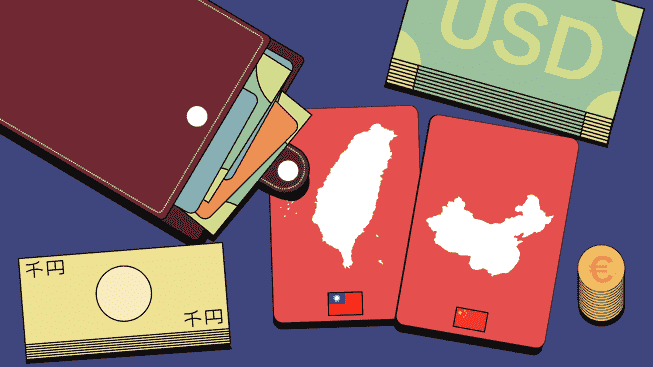Threats and military maneuvers are part of everyday life in Taiwan. How and why the conflict is affecting our investments.
Luke Sustala
You are reading an excerpt from the «Means & Purpose» newsletter. At «Mittel & Zweck» we want to put aside the very German tradition «you don’t talk about money» and talk to you about finances – and how you can shape your future with a good plan and the right tools. You can subscribe here. And here you can see what you’ve missed so far.

Taipei, we have a problem. Since the visit of American politician Nancy Pelosi to Taiwan, Chinese saber-rattling against the island state has hardly stopped. Threats and military maneuvers are part of everyday life. These include warnings to Canadian politicians who intend to visit Taiwan, or an imminent trade blockade by the Chinese regime.
The Taiwan conflict seems far away, but it is also a big topic for investors and investors. First of all, this is due to the obvious interdependencies: The Asian island state is an enormously important global player in the field of computer chips. As the world’s largest contract manufacturer of chips, Taiwan Semiconductor Manufacturing Company (TSMC) is a key player in the global technology industry.
Smartphones and computers around the world only become the innovative products that customers demand with preliminary products made in Taiwan. Should China really attack the chip stronghold Taiwan, the world economy would be threatened with catastrophe, as the NZZ analyzed in detail.
A geopolitical dispute or even a war over Taiwan also meant a crisis with serious consequences for stock portfolios. Not only directly, because TSMC is one of the most valuable companies in Asia. In equity funds and ETFs on the Asian market, no vehicle can avoid this company, the Taiwanese chip manufacturer is often the largest position in emerging market funds with an Asia focus. If the digitization and smartphone boom is anything like the modern gold rush, then TSMC provides the shovels and tools.
Taiwan’s important role in emerging market equity funds
Taiwan may be a small island, but its role in international finance is much larger. A look at the iShares MSCI EM Asia ETF shows this. The fund follows the MSCI index for emerging markets in Asia. In this, Taiwan even has a larger portfolio weight than the comparatively much larger Indian economy. India is represented at 17.7 percent in the index, Taiwan at 18.8 percent. Almost half of this goes back to TSMC (MSCI EM Asia Index fact sheet).
Should China resort to severe sanctions, which the New York Times warned of in a new analysis, this could hit Taiwan’s economy and many emerging market portfolios hard.
But that is of course not the worst possible consequence. If China were to follow up the military saber-rattling with an intervention, then that would probably also entail Western economic sanctions against China. After all, Nancy Pelosi’s visit was also about the democrat wanting to show support for an independent Taiwan.
So if the Taiwan conflict resulted in mutual sanctions between the US and China, that would have immediate consequences for investors. China is playing an increasing role in many emerging market and global portfolios, and an economic war analogous to the situation in the much smaller economy of Russia would have massive consequences for investors.
In Russia, for example, foreign investors with Russian stocks have faced sanctions massive problems to get, the values of their holdings have fallen dramatically in some cases. In some cases it is no longer possible to hold Russian stocks, many formerly large ETFs have been closed and the products have been taken off the market.
A few years ago, China still had a comparatively isolated capital market. For a long time it was not even possible for international investors to hold stocks in mainland China. Most of the time, companies were sought that were listed in Hong Kong, for example, but did business in China.
However, the local market has been opened up in recent years and China has become part of every stock portfolio. If that were to change in a conflict over Taiwan, then most funds and ETFs would be in for a big storm.
However, further turbulence would also be possible and would affect investments in China. So was the Chinese currency after the start of the year partly under pressure. First of all, the tough lockdowns in the wake of the coronavirus pandemic hit the Chinese economy. And now there are also the uncertainties surrounding Taiwan.
A conflict and decoupling of the Chinese economy would also lead to turbulence on the currency markets and thus for all investors with yuan in their portfolios.
